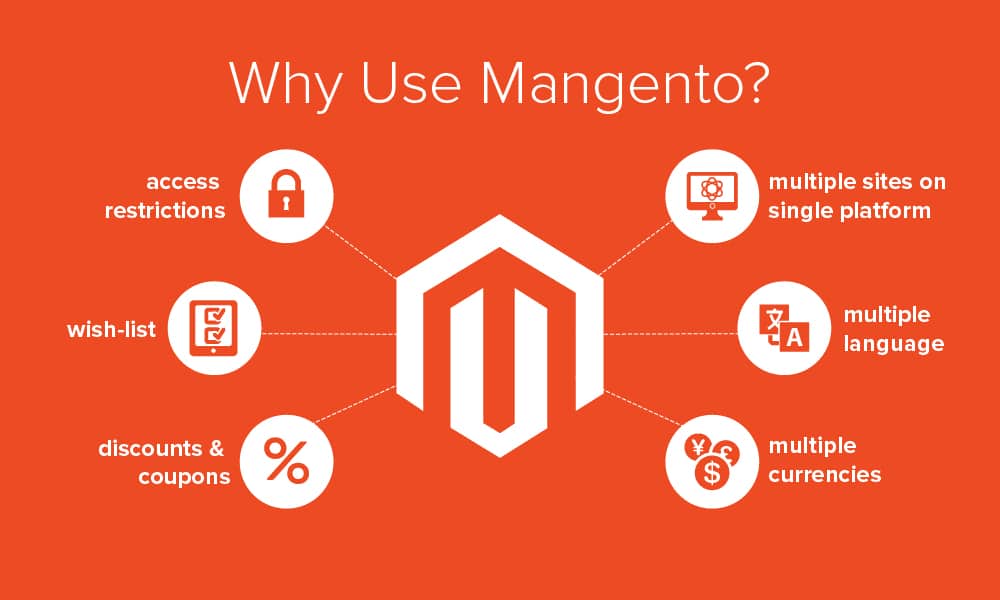Best and Cheap Magento 2.3.4 Hosting Fantastic Deal 15% Off
What is Magento?
Magento Commerce is the leading provider of open omnichannel innovation. Magento open source digital commerce platform and cloud-based omnichannel solutions empower merchants to integrate digital and physical shopping experiences.
Magento is one of the best options and here’s why: In today’s world, where everyone is connected to the web – if you’re not online, the chances are high that your store will remain unknown. Unless you are selling bread and milk, you should probably consider an online store for your products.
Unlike a normal store, an online store gives you great visibility to a very broad range of customers. Online, you can sell locally, nationally and, why not, internationally.
Proprietary Platform
While this solution offers a platform perfectly tailored to your needs without any other bulk and no limitations, this option is usually high-cost, high-maintenance and time-consuming.
If you were to build such a platform, it would take you a good two-to-three months to have it up and somewhat bug-free. If you were to hire someone to do this for you it would cost you somewhere from $3,000 and up, depending on what you want and need.
Open Source
Magento is a free ecommerce platform released under Open Source License ver 3.0 and built using PHP and other open source tools. By using these technologies and remaining open source means that Magento as a platform has several distinct advantages over the competition. The Platform is highly adaptable and could be modified endlessly to exactly fit project requirements.
Using open source tools also means that the platform guarantees a robust performance and enhanced security for merchants and developers.
Custom Designed for Ecommerce
These days all major CMS’s including WordPress, Drupal and others offer ecommerce capabilities (right out of the box in some cases!), they are designed with an ecommerce-only approach.
Thus Magento powered ecommerce solutions offer a better experience to everyone from the developers to the store administrators to end users who come to shop at the storefront. Over years, Magento has evolved into a feature rich ecommerce solution that comes prepackaged with all the essential tools needed to build up an ecommerce web store.
The Magento Community
Where there is an open source app, there is a community!
Since Magento is a very popular open source ecommerce platform, there is a huge community of store owners, merchants, developers, designers, agencies, ecommerce consultants, tech solutions providers, and general end users around the globe who discuss everything Magento in great details. The community ensures that the platform remains up-to-date, fast, reliable, secure and free from bugs. The good thing about this community is the very welcoming nature that makes every newcomer feel right at home.
No Hosting Related Restrictions
Unlike Shopify and Volusion (the “made for ecommerce” platforms), Magento allows you to choose the hosting solution of your choice. This way you could select the best hosting solution provider that fits your requirements and your budget. Similarly, when it is time to migrate your store, there is no restrictions on when and where you could host your store.
Default Responsive Design
The share of mobile devices in global ecommerce transactions is rapidly growing and soon it will surpass all other device classes. Realizing this, Magento incorporates HTML5 capabilities, ensuring that the storefront has a responsive design that caters flawlessly to mobile devices. In addition, Magento offers features such as Griding, image scaling, AV capabilities, gesture controls, drag-and-drop, etc.
Third Party Components Integration
Third party plugins and extensions greatly ease out the lives of Magento store administrators and developers. Magento offers limitless and restriction free integration of all third party components, thereby shortening the development and deployment timeframes considerably.
The good thing is that many of these components are free to use. Others are available for just a couple of dollars.
With the help of extensible API in Magento, you can connect to any application or any plugin of your choice without any hurdles. Whether it’s a payment gateway, an analytics tool or shipping, and tracking method, you only need to find the best extension and plug it into your Magento store within no time.
Magento Extensions & Customization Options
Every industry has its own ecommerce store design conventions. What works for fashion & apparel may not work for a furniture retailer. Similarly size, scale of operations, customer support requirements, billing and delivery options, etc. pose various challenges in the ecommerce environment.
Magento is a highly customizable ecommerce platform. It allows you to develop incredible frontend user experiences by editing layouts and templates or add new colors and styles of your choice. Backend refinements can also be redesigned to fulfill business requirements by rewriting code, modifying events and grids.
One of the key points of interest for all Magento users is the vast marketplace of extensions and modules. Magento users can discover multiple extensions effortlessly to extend and customize their stores and distinguish their storefront from the competitors’ by utilizing different augmentations.
Fast & Scalable
When it comes to page load speed, Magento is a clear winner!
Slow loading online stores go down very quickly. In many cases, the loss from slow pages is permanent and greatly contributes to the demise of the business. Magento with high-end caching technologies such as the Cloudways Full Page Cache and other database optimization techniques such as Memcached and Redis speed up the stores considerably.
Magento is suitable for small to large (and even huge) ecommerce stores simply because it’s flexible enough to grow with your business. In fact, Magento might surprise you with its performance, stability, and reliability.
Multiple Stores
Many ecommerce platforms let you have a single store per account. With Magento, you can setup multiple stores that could be managed through a single backend. You can control stores’ inventory, orders, billing, customer information, using a single admin panel.
Each store can have different themes and templates associated with them. You can also assign a subdomain for individual stores. The ease of controlling all of the stores simultaneously through a single admin panel greatly simplifies management and administration of multi-stores that operate in a single or multiple categories.
What’s New in Magento 2.3.4?
Highlights
Look for the following highlights in this release:
Substantial security enhancements
This release includes the following security enhancements:
Over 30 security enhancements that help close cross-site scripting (XSS) and remote code execution (RCE) vulnerabilities
No confirmed attacks related to these issues have occurred to date. However, certain vulnerabilities can potentially be exploited to access customer information or take over administrator sessions. Most of these issues require that an attacker first obtains access to the Admin. As a result, we remind you to take all necessary steps to protect your Admin, including but not limited to these efforts: IP whitelisting, two-factor authentication, use of a VPN, the use of a unique location rather than /admin, and good password hygiene. See Adobe Security Bulletin for a discussion of these fixed issues. All known exploitable security issues fixed in this release (2.3.4) have been ported to 2.2.11, 1.14.4.4, and 1.9.4.4, as appropriate.
Security enhancements and fixes to core code
Additional security enhancements include:
- Removal of custom layout updates and the deprecation of layout updates to remove the opportunity for Remote Code Execution (RCE). The Custom Layout Update field on the CMS Page Edit, Category Edit, and Product Edit pages has now been converted to a selector. You can no longer specify an entity-specific layout update with text but instead must create a physical file that contains the layout updates and select it for use.
- Redesigned content template features so that only whitelisted variables can be added to templates. This avoids the situation where administrator-defined templates such as email, newsletters, and CMS content can include variables and directives that can directly call PHP functions on objects.
Platform upgrades
The following platform upgrades help enhance website security and PCI compliance.
- Enhancements to the message queue framework. Magento now supports the latest release of RabbitMQ v3.8, which is the third-party technology that underlies the Magento message queue framework.
- Improved page caching and session storage. This release has been tested on the latest stable release of Redis v5.0.6.
- Enhanced support for MariaDB 10.2. Before Magento 2.3.4, when using declarative schema with MariaDB 10.2, Magento threw an error indicating that the schema was not up-to-date after running
bin/magento setup:upgrade. With this release, we have normalized the values returned by MariaDB, which allows system integrators to use declarative schema with both MySQL and MariaDB. - The core integration of the Authorize.net payment method has been deprecated. Please use the official payment integration that is available on Marketplace.
Note: Magento 2.3.4 has not been tested with PHP 7.1. PHP 7.1 reached EOL (End of Life) on December 1, 2019. We recommend updating your deployment to a supported version of PHP.
Performance boosts
Merchants and customers will see performance improvements as a result of these enhancements:
- Redundant non-cached requests to the server on catalog pages have been eliminated by refactoring the customer section invalidation mechanism and improving banner cache logic.
- PHTML files have been refactored to better support parsing by the bundling mechanism. Our new bundling mechanism now identifies all dependencies on JavaScript.
- Added the ability to disable statistic collecting for Reports module by default. A new configuration setting (System Configuration > General > Reports > General Options) allows merchants to completely or partially disable Magento Reports. (Statistics collection for the Reports module is disabled by default. Magento recommends disabling Reports functionality for performance reasons when this capability is not required.)
Infrastructure improvements
This release contains 250 enhancements to core quality, which improve the quality of the Framework and these modules: catalog, sales, PayPal, Elasticsearch, import, and CMS.
Merchant tool enhancements
- Integration with Adobe Stock image galleries. The new bundled Adobe stock integration extension enables merchants to add high quality media assets to their website content without leaving the Magento Admin. Merchants can use the searchable interface in the Magento Media Gallery to explore, preview, license, and deploy stock images in website content.
Inventory Management
Inventory Management enhancements for this release include:
- Addressed a known performance issue that caused higher than expected loads on the database server in scenarios involving the shopping cart.
- Updated the Inventory Reservations CLI command to reduce memory usage when finding and compensating for missing reservations on large catalogs.
- Resolved multiple quality issues, including those related to credit memos, grouped products, source and stock mass actions.
GraphQL
This release includes improved GraphQL coverage for search, layered navigation, cart functionality. The following mutations/queries are available:
- Guest carts can now be merged with customer carts. The
mergeCartsmutation transfers the contents of a guest cart into the cart of a logged-in customer. - A customer can start an order on one device and complete it on another. Use the `customerCart query to obtain the cart ID for a logged-in customer.
- Layered navigation can use custom filters. The
filterattribute of theproductsquery now requires theProductAttributeFilterInputobject. You can specify a pre-defined filter in this object, or define a custom filter. As a result, layered navigation on your website filters on the attributes you need. - You can search categories by ID, name, and/or URL key. The [
categoryList](/guides/v2.3/graphql/queries/category-list.html) query replaces the deprecatedcategory` query. - The
ProductInterfacesupports fixed product taxes (such as WEEE). Use thestoreConfigquery to determine whether to store supports these taxes. - The
cartobject has been enhanced to include information about promotions and applied discounts at the line and cart levels.
PWA Studio
For information on these enhancements plus other improvements.
dotdigital
- Live Chat powered by dotdigital enables merchants to increase conversion rates, and keep customers coming back with real-time engagement. All Magento 2.3.x merchants (both Magento Open Source and Magento Commerce) can receive a free live chat agent without the need for a full dotdigital Engagement Cloud license.
- Engagement Cloud includes a new Chat widget that makes it easy for shoppers to communicate in real time with customers as they shop in your store. Chat can be accessed from the Engagement Cloud section of the Magento configuration, or directly from your Engagement Cloud account.
Google Shopping ads Channel
Google Shopping ads Channel Release Notes describes all changes to this feature for Magento 2.3.x.
Vendor-developed extension enhancements
This release of Magento includes extensions developed by third-party vendors. It includes both quality and UX improvements to these extensions.
Klarna
Klarna Payments has a new Data sharing on load field in the Magento configuration that can be set to share customer data either after the transaction is authorized, or when the Klarna payment method is selected during checkout.
How to Choose The Best and Cheap Magento 2.3.4 Hosting?
How to choose the best and cheap Magento 2.3.4 hosting? Choosing the best and cheap Magento 2.3.4 hosting is not a simple task especially with low price offers. You need to take a large number of factors into consideration, including the Magento 2.3.4 compatibility, usability, features, speed, reliability, price, company reputation, etc. Therefore, we have established this Magento 2.3.4 review site, which is designed to help you find the best and cheap Magento 2.3.4 hosting within minutes, based on our specialized editors’ Magento 2.3.4 hosting experience and real customers’ feedback.
Best and Cheap Magento 2.3.4 Hosting
ASPHostPortal.com

ASPHostPortal.com claims to be proud of their management staff who have years of experience working in the web hosting industry. ASPHostPortal’s aim is to offer the best web hosting value to their clients by offering products and solution in an efficient and effective way. The ASPHostPortal.com’s hosting platform on Windows Server is compatible with Magento 2.3.4 hosting. Of course, you can feel very comfortable with their hosting service. Their best and cheap Magento 2.3.4 hosting plan is starting from $3.81/mo only. And with their promo code, you can get free domain too. Not only that, they also offer 30 days money back guarantee. Their servers are 99.99% uptime, it is important thing that you need for your Magento site, so your site is never down.
ASPHostPortal.com provides Magento-optimized managed hosting solutions for online merchants of all sizes. Since 2008, they’ve been committed to delivering superior performance, reliability, security, and support to their clients. Every Magento hosting deployment is engineered from the ground up to be responsive, scalable, and cost-effective.





